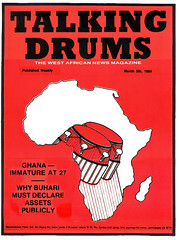Comment - A 27-Year Old Child
Twenty seven years ago, when the Gold Coast became the independent state of Ghana, it surely looked like there was going to be a roaring fire, the beginnings and high hopes seemed to point to a worthwhile life. It would have been the most courageous pessimist who would have imagined on March 6th, 1957 that today, 27 years after the event, Ghana would be in such dire straits. How then can something that started on such very high hopes have become such an unmitigated disaster? Even though it is now fashionable to say that those early days were so much better, the fact remains that the seeds for the disaster were planted and visible right from the beginning.
The idea of the 'corrupt politician' had its beginnings then and it is very difficult for many to erase the memory of 'golden beds' and 'marble floors' and the instant transformation of the village loafer into the chauffeur driven Mercedes owner once he joined the party in power.
The popular Nigerian joke at the time about Ghana was "on Radio Ghana, Mondays to Saturdays are: Osagyefo, Osagyefo, Osagyefo," and Sundays are "Baba Yara, Baba Yara - Goal!"
The press had abdicated its role and all the institutions that should have been built up to ensure that constitutional rule worked when the first strains appeared, were all subverted.
To convince ourselves that we were really independent, it was considered proper for government to be big and powerful and central authority to be increased until individualism was frowned upon and local organisations were undermined.
The very characteristics of independent Ghana's first Prime Minister/President which helped to put the country on the map were the very things that were to lead to chaos internally. His grandiose plans and ability to excel at swaying crowds to himself were all very good in painting Ghana as the leader of the radical group, the leader of the anti-colonial drive. The promise to turn Ghana into a fully industrialised country in twenty years, the official opening of factories, the almost total and royal-like disregard for money and arithmetic, were good for headlines but disastrous for long-term Ghana.
Industrialisation was thought to be the mark of independence, so insecure were Ghanaians in their self estimation that the firm agricultural base the country had, had to be ignored in favour of industries even if more than 70 percent of the materials needed to make the factories run, had to be imported, but if people used to farm before independence, they had to work on factory floors now to convince themselves that they were indeed free.
The inability to separate the individual, that happened to be in power at the moment, from the state, a phenomenon that has dogged the country these past 27 years, also had its roots right from these times; if the Prime Minister's effigy were not put on the currency, the population will not believe that they are indeed independent of their colonial masters. It reached ridiculous proportions sometimes, as when the Principal Secretary for Finance pointed out to the President at a time when he was being carried away by one of his rather more grandiose schemes, that there was no money to finance the project.
The President's anger and retort astonished the Principal Secretary who thought he had seen it all before "who told you I don't have money, do you know how much I have in my account at the High Street Branch of Ghana Commercial Bank, or in Barclays Bank in London ...
'The CPP was Kwame Nkrumah, and Kwame Nkrumah was Ghana', so nobody could say he (Ghana) couldn't do something when he (Nkrumah) had money in his account.
CONQUERED TERRITORY
All very good until people start forgetting that the state has an identity all its own and when the rulers started confusing not only themselves but their families and friends with the state also, until it became a free for all in the Acheampong era when the country was no longer being identified with privileged individuals but had been turned into a conquered territory to be looted, raped and pillaged at will.Very sadly, the past two years in Ghana have demonstrated that in spite of having been the first black African country to gain independence, and all the other titles that Ghanaians like to claim for themselves, that sense of self-doubt and insecurity are still very alive.
Why else are Flight-Lieutenant J. J. Rawlings and his friends still so pre-occupied with "imperialist forces, super powers and their cohorts?" How come Ghana can still not do anything quietly and competently and on a scale that the people can cope with?
Twenty seven years ago, Dr Kwame Nkrumah said his people would not quite believe that they were free of their colonial masters unless his name was on the currency, stamps, motorways, streets, schools and unless the country had its own airline, shipping line. Today Flt-Lt Rawlings says Ghana won't be truly independent unless the country succumbs to a political theory dreamt up by him, a judicial system fashioned and controlled by him, an Armed Forces and Police Force that suit his personal eccentricities and unless Ghanaian society is re-structured to suit a still undefined model. Strange, that after 27 years, Ghana has still not come to terms with itself and her independent status.
